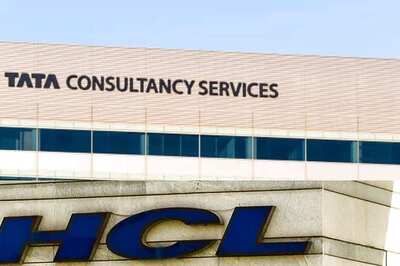
views
Washington/London: The United States agreed to inject $20 billion of new capital to rescue one of the world's top banks and European leaders said on Monday they would stand by European industry, especially the automobile sector.
Washington, also under pressure to rescue its own ailing motor industry, effectively guaranteed most of Citigroup Inc's, potential $306 billion losses on high-risk assets.
It was the biggest bank bailout yet and a measure of the crisis sweeping the world.
The Gulf emirate of Dubai, home to a new luxury mega-resort built on a manmade palm-shaped island visible from space, announced it was reining in a building spree symbolic of extravagant boom years leading up to the current crisis.
The United Arab Emirates began to bail out Dubai's lenders and consolidate its financial sector.
Concerns Europe has entered a deep recession that could last well into next year were reinforced when a key survey of German corporate sentiment hit its lowest level in nearly 16 years in November.
French President Nicolas Sarkozy said after talks with German Chancellor Angela Merkel their "determination to help European industry and notably the automobile industry is total".
The Citigroup intervention had been widely expected in some form, but Asian markets trimmed losses, while European stocks rose 4 per cent on news the US Treasury would not allow the number two US bank to fail in the way of rival Lehman Brothers.
Citigroup shares jumped more than 30 per cent to $5.07 before opening in New York US stock index futures pointed to a generally higher opening on Wall Street. S&P 500 futures were up one per cent.
"The move will help the markets not implode today," said Rory Robertson, interest rate strategist at Macquarie in Sydney. "It's all good stuff but the fact that the Fed has to bail out one of the biggest banks in the world is not exactly a vote of confidence."
Citigroup has the farthest international reach of any US bank, with operations in more than 100 countries.
The bank was widely felt to be too big to be allowed to fail. The plan calls for Citigroup, America's second-biggest bank, to issue $27 billion in preferred shares to the US Treasury and the Federal Deposit Insurance Corp.
The Fed, Treasury and FDIC in return will shoulder most of the potential losses on Citigroup's $306 billion portfolio of debt assets, beyond an initial $29 billion in losses which Citigroup would be responsible for.
"The US government is taking the actions necessary to strengthen the financial system and protect US taxpayers and the US economy," the Federal Reserve, the Treasury Department and FDIC said in a joint statement.
Widespread response
Citigroup, whose shares slumped 60 per cent last week, was not the only bank having to raise more funds. Asian-focused UK bank Standard Chartered said it planned a $2.7 billion rights issue to boost its capital reserves, while other banks were also expected to raise money.
Government sources said Turkey was still talking with the International Monetary Fund on the scale of a new loan accord.
Turkey is not under the same strains that have forced other emerging markets countries to seek IMF aid, but has begun to see a sharp slowdown in its $700 billion economy and its currency has lost a third of its value in two months.
The global financial crisis has torn through the Arab Peninsula, until recently thought immune due to massive sovereign savings and earnings from energy exports, with almost the same violence as in Europe and North America.
In a major policy shift, the United Arab Emirates federal government will inject capital into its Emirates Development Bank, a newly created rescue vehicle preparing to absorb merging Islamic lenders Amlak and Tamweel, a leading official said.
A cash injection would represent the first big step by the federal government, dominated by the conservative oil-exporting emirate of Abu Dhabi, to bail out high-flying banks in neighbouring Dubai, suffering under the global crisis.
The Munich-based Ifo economic research institute said its German business climate index, based on a monthly poll of around 7,000 firms, declined to 85.8 in November from 90.2 in October, the biggest month-on-month drop since September 11, 2001.
"It seems as if a wildfire is running through the German economy at enormous speed," said Carsten Brzeski, an economist at ING Financial Markets.
"If you think the third quarter was bad, just wait for the fourth quarter. It might be a disaster."
UK stimulus package
Aides said U.S. President-elect Barack Obama was considering delaying a campaign promise to rescind tax cuts on high-income Americans, while the British government was set to announce a stimulus package including temporary tax cuts.
Obama, who takes over from President George W. Bush on January 20, announced his top economic team on Monday in Chicago.
He nominated Timothy Geithner, president of the New York Federal Reserve Bank, as Treasury secretary.
Lawrence Summers, 53, Treasury secretary in the Clinton administration, will help shape policy as director of the White House National Economic Council.
The potential size of the latest US stimulus plan appears to be growing from the $100 billion to $300 billion previously suggested by congressional leaders.
One influential Democrat, Senator Charles Schumer of New York, said on Sunday a package of up to $700 billion was needed to support the American economy.
Britain is expected to announce a 20 billion pounds ($30 billion) package, which will cut sales tax and offer help for businesses, low earners and struggling home owners.
"I don't see this as a gamble. I see this as necessary, responsible action," Prime Minister Gordon Brown told the BBC.




















Comments
0 comment